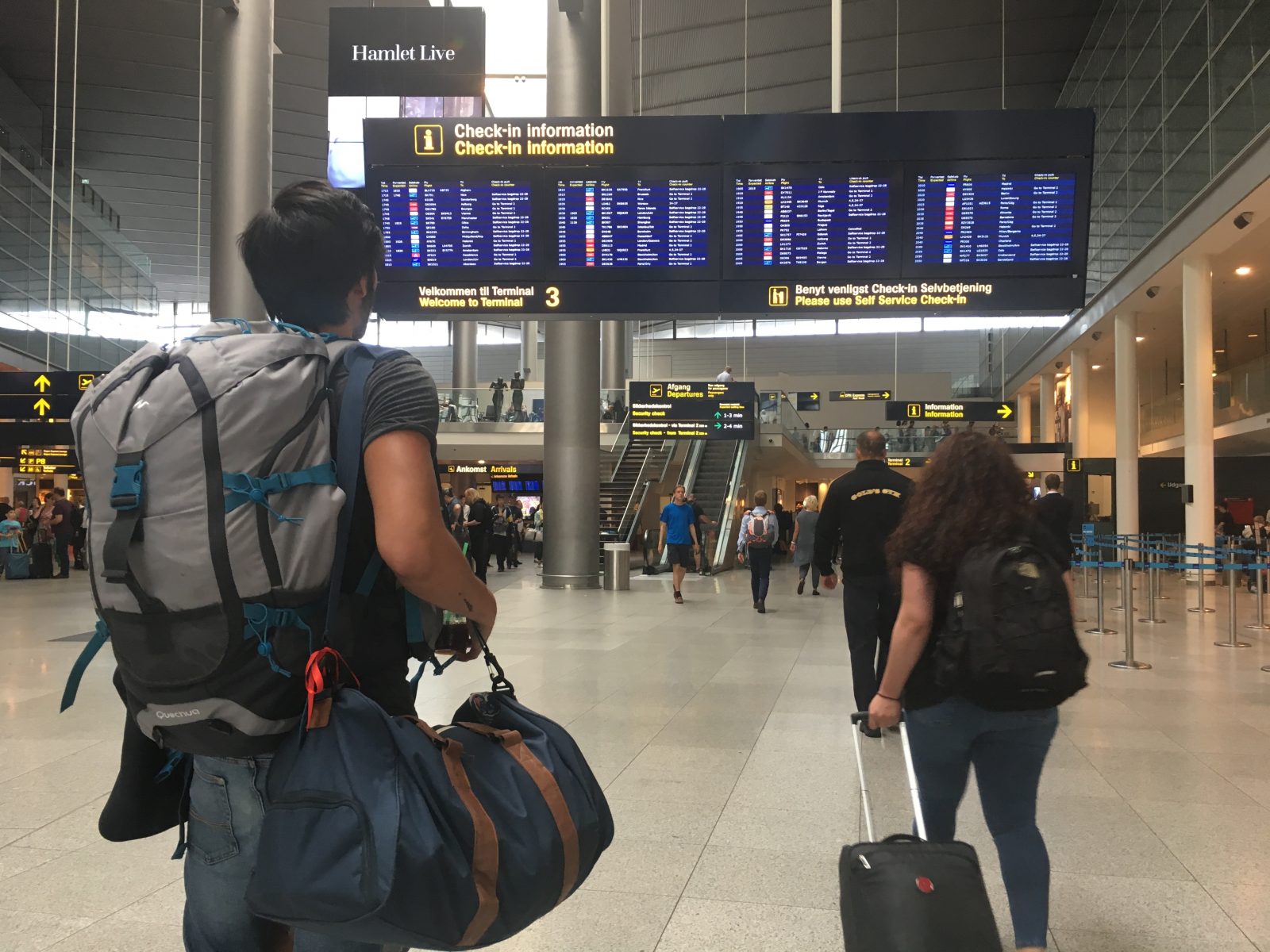Housing chaos: Long-distance commuting

Jeremie has spend more time at the Copenhagen Airport than most. (Photo: Anne M. Lykkegaard)
Jeremie has felt the ruthlessness of the housing market in Copenhagen. Having to stay at hostels and in worst cases commute between Denmark and his home country. Now, he has finally found a room for six months.
Copenhagen Airport is bursting with a crowd carrying four-wheeled suitcases and people armed with sunglasses, sun hats and shorts. It’s the 2nd of August in the evening – travelers prime time.
Jeremie is carrying three large bags with him, and like most of the other people at the airport he too is going on a vacation. But to Jeremie, Copenhagen Airport is a little more than just the starting point of a vacation.
Up to two times a week for two months, Jeremie would go to or arrive at Copenhagen Airport to travel between Paris and Copenhagen. During that time, he was homeless and after living at a hostel in Amager, he figured out that spending money on flight tickets and then waver between staying at his parents’ in Paris and his friends’ in Copenhagen was a cheaper solution.
“I would be in Copenhagen from Monday morning at 8 AM, work until Tuesday evening, and then go back home to France. I actually managed to save some money by doing it, but it was tiring as hell,” says Jeremie, who doesn’t want his last name published and studies a master degree at CBS.
Welcome to the battlefield
Each year, from around July to September, the housing market in Copenhagen becomes a battlefield. Here there are no-holds-barred.
In those three months, thousands of students – Danish and internationals alike- are accepted to universities in this region, raising the demand for accommodation from sky high to galactic proportions.
I lied to my mom about staying at a hostel. I didn’t want to worry her
Jeremie, CBS student
Facebook will be flooded with posts from people who are asking for a place to live, dubious landlords will do their best to lure money out of desperate students, and rental sites know exactly how much the subscription is worth. And apparently, it’s a lot.
Furthermore, the price per square meter for an apartment has gone up by 4,1 percent already in just the first six months of 2017 in Copenhagen. And this rise in price isn’t necessarily legal, argues a housing economist in the Danish newspaper Børsen.
On top of that, Copenhagen is roughly in need of 9,500 apartments for students, and that number only seems to be going up, writes the Univerity Post at University of Copenhagen.
This is what Danish, as well as, international students are up against when entering the housing market in Copenhagen, but it might be a little more difficult if you are from outside the Kingdom of Denmark.
Living in a bag
Jeremie was excited when he, in mid-June, was accepted to do his master degree at Copenhagen Business School starting in September 2016.

Two weeks after he got his acceptance letter, he began looking for an accommodation by subscribing to three different housing websites, as he heard that other friends had luck finding places within days. But for him, nothing happened.
“I actually tried to hide the fact that I’m Asian. Although, I don’t think that had anything to do with my bad luck in finding a place to stay,” he says at a café in the airport.
September came closer, and one week before the start of the semester, Jeremie came to Copenhagen with his parents. Maybe it was easier to find a place while being in the city.
Unfortunately, that was not the case.
Jeremie had only one option left: to stay at a hostel. And so he did, for 1,5 months.
“I didn’t want to bother my friends in Copenhagen, so I thought I’d just stay at a hostel. Although, it wasn’t much fun, seeing as I couldn’t really invite anyone over here. Also, I lied to my mom about staying at a hostel. I didn’t want to worry her,” says Jeremie, and adds that it was about the same price for an apartment as to stay at the hostel.
Weekly visits to Copenhagen Airport
Jeremie had a stint of good luck in October 2016 owing to a friend of his renting out his room for 1,5 months and also by getting a part time job.
But by the beginning of December, Jeremie was homeless yet again. Now he began having weekly visits to Copenhagen Airport so that he could fly home and stay at his parents’ most of the week and only go back to Denmark in order to work.
“At some point I was tired of it. Not stressed, just tired. I wasn’t happy, and it was hard to enjoy my stay because I was thinking about this housing situation all the time,” he says.
Jeremie looks a little tired, when I for the 17th time ask what happened next.

“I found a room for six months,” he says with relief.
But even though Jeremie could relax for a little while, staying at the apartment wasn’t all that easy, especially since he couldn’t have his address registered there. Instead, he had his address registered at a friend’s place.
A room for DKK 7,200
Jeremie’s contract for the room ended by the end of July this summer, but luckily, he had in the meantime found another room running from September and six months onwards.
“My semester doesn’t start before September, so meanwhile, I just go back to France and on vacation,” says Jeremie.
One might think: why didn’t you ask CBS to help? Well, Jeremie did.
“I actually went to The International Office with some friends to ask for help, but unfortunately we were too late. They said we could try and apply for rooms at Basecamp near Nørreport, but a room there is like DKK 7,200 a month. Who can even afford that? So, it didn’t help much,” he says.
I can’t complain
Jeremie is experienced in travelling and finding accommodations in other countries – including Singapore where the housing market might be even more crowded. But he has never experienced anything like Copenhagen.
“I’ve never had problems finding accommodation before, so I was a bit surprised when I came to Copenhagen. I guess the culture is just different here,” says Jeremie.
What do you think about this entire situation?
“I really can’t complain. I just had to face this and take it as a kind of responsibility training. I know that others might panic about this, but it just makes me more prepared for the next time. I don’t see it as a bad thing. And I just learned that finding accommodation in Copenhagen goes by word of mouth,” he says as a final remark.

































































































































Great article!
https://frederikbaastrup.dk